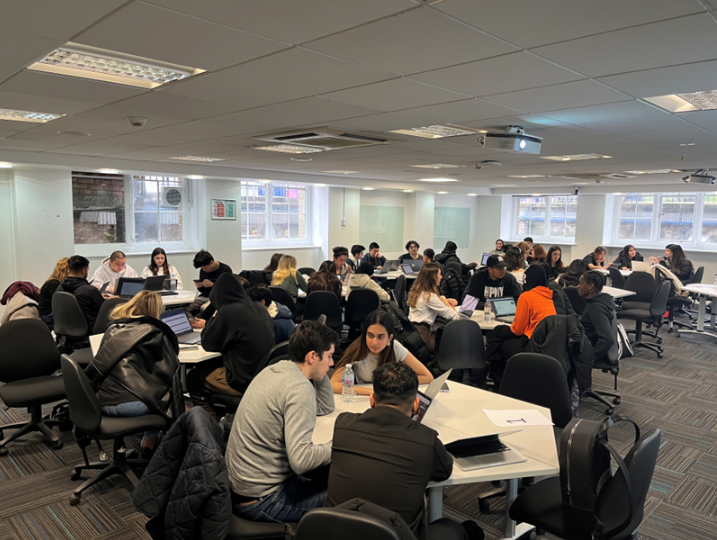The Coffee Shop Challenge: An Inclusive, In-Curriculum Business Simulation for Employability Skill-Building.

‘Current Challenges in Business and Management-2’ is a core first-year undergraduate module in the BSc Business Management in the School of Business and Management. It adopts a project-based experiential learning approach and integrates a computer-based business simulation where students run a virtual coffee shop. Designed with widening participation (WP) in mind, the module fosters teamwork, critical thinking, communication and real-world problem-solving in an inclusive, in-curriculum format.
‘What I like about education in QMUL is that it gives not only theoretical knowledge, but also practical one. This semester our team ran our own virtual coffee shop and won among the rest in all respects! Thanks, Georgy, for this experience!
Responding to a need
This initiative addresses persistent challenges faced by WP students in Business and Management education, particularly their underrepresentation in graduate-level employment, limited engagement with extracurricular skills development, and weaker outcomes in key academic and graduate attributes.
Internal evaluations in 2018/19 highlighted Year 1 underachievement, low engagement, and gaps in critical skills such as teamwork, communication, and problem-solving.
Recognising that WP students often cannot access optional enrichment activities, we saw an opportunity to embed employability skill development directly into the curriculum through inclusive, authentic project-based learning and simulation-based assessments.
This aimed to improve student progression, career readiness, and sense of belonging from the outset of their university journey.
Approach used
Context: Learners and learning environment
The coffee shop simulation, developed by external company Business Smart International, is implemented within ‘Current Challenges in Business and Management-2’, a core first-year undergraduate module on BSc Business Management programme in the School of Business and Management.
The module cohort of c. 300 students includes a high proportion of WP students - many of whom are first-generation university students or from lower-income households. These students often face competing priorities such as part-time work or caring responsibilities, limiting their access to optional extracurricular skill-building activities.
The module is delivered in a 2-hour weekly workshop format to groups of 50–60 students, with learners pre-assigned to teams of 5–6 to work on two projects over the semester - one of which is a coffee shop business simulation.
Implementation: The coffee shop business simulation
The computer-based business simulation is part of a broader experiential learning strategy to embed employability skills directly into the curriculum. It tasks student teams with managing a virtual coffee shop in a busy shopping mall, where they assume leadership roles (e.g. CEO, Marketing, Finance, HR, Operations) and make strategic decisions over six simulated trading months (rounds).
Teams must analyse market data, define a business (and sustainability) strategy, and make decisions across core business functions, including pricing, staffing, stock management, and marketing, while striving to achieve strong market share, customer satisfaction, staff wellbeing, and profitability.
The simulation is designed to integrate and reinforce learning from other Year 1 modules, such as Fundamentals of Management, Accounting for Business, Marketing, and Human Resource Management, by requiring students to apply core business concepts in a practical, high-pressure environment. This cross-module integration helps build coherence across the first-year curriculum and strengthens students’ understanding of how different business functions interrelate.
The simulation runs over five teaching weeks (TWs 6-11), alternating between six in-class and out-of-class rounds. Students receive regular feedback after each round, encouraging strategy refinement and data-informed decision-making.
The activity promotes inclusive participation through pre-assigned diverse teams and structured collaboration expectations (e.g., simulation in-class work and guidance, regular out-of-class meetings, shared decision-making, and co-presenting). It fosters leadership, teamwork, communication and collaboration skills in a dynamic and competitive setting, offering all students a realistic and engaging introduction to business governance, management, and performance.
Assessment: Balanced scorecard and presentation
Assessment focuses not only on the final simulation performance metrics but also on students’ critical thinking, communication, and reflection - core employability competencies:
- A balanced scorecard (60% of the mark) is used to assess team performance on the simulation, measuring customer satisfaction, company profit margin, and staff capability/satisfaction, with an average overall score determining the winning team in each workshop group.
- The business simulation activity then culminates in a group presentation (40% of the mark) where teams critically analyse and reflect on their strategy, performance outcomes, and learning process.
Impact on learners and educators
The coffee shop business simulation significantly enhanced student engagement, skill development, and confidence. It contributed to the highest engagement score among all first-year modules in 2023/24, with 90% combined attendance and VLE interaction.
Student end-of-module reflections and evaluations highlighted the simulation as one of the most engaging and practically useful aspects of the module and Year 1 programme, describing it as ‘challenging’, ‘realistic’, and ‘confidence-building’. Many reported increased confidence in applying business concepts, managing time and tasks within teams, and presenting outcomes under pressure. Although students faced challenges in collaboration and time management, they valued these as authentic learning experiences that prepared them for real-world work environments.
Reflections also indicated that working in diverse teams fostered a greater sense of inclusion and belonging. For WP students, who may struggle to engage in optional enrichment activities, the in-curriculum nature of the simulation ensured equal access to meaningful skill-building opportunities.
From an educator perspective, the simulation marked a pedagogical shift toward more experiential learning and authentic assessment. Insights from in-module and post-module teaching team debriefs indicated that staff observed stronger peer-to-peer learning and greater motivation during simulation weeks. The format also enabled more targeted feedback on graduate attributes, such as problem-solving and communication, which are often under-assessed in early undergraduate study.
Module evaluation data supports the positive impact: in 2023/24, 83.4% of students agreed the module challenged them to achieve their best work, while over 91% rated the feedback as useful. These results highlight the simulation’s effectiveness in promoting both academic engagement and practical skill development.
Recommendations
- Design for inclusivity from the outset
Drawing on Flores and Bauman’s work ‘Teaching Methods in Business: Group and Team Work’, student teams were pre-assigned to maximise diversity in gender, nationality and ethnicity, fostering inclusion and early peer connections. Avoiding self-selection helped reduce the risk of marginalisation and encouraged collaboration across different backgrounds.
- Integrate simulation with curriculum
Ensure the simulation aligns with content from other modules so students can apply theoretical knowledge in practice. This reinforces learning coherence and highlights real-world relevance from the start of the academic journey.
- Scaffold the learning experience
Provide structured support through workshops, regular check-ins, and clear expectations. Scaffolding helps students, especially those with less prior exposure to experiential learning or professional environments, navigate the complexity of decision-making.
- Assess both process and outcome
Use a mix of performance metrics and reflective presentations to assess not only results but also teamwork, critical thinking, and communication. This gives a fuller picture of student learning and development.
- Gather and act on student feedback
Use reflections and evaluations to iteratively improve the design. Student insights can highlight areas of challenge (e.g. time management or role clarity) and suggest opportunities for refining team dynamics or pacing.
‘This challenge taught us practical business solutions beyond book! At first it seemed easy to make decisions, but every week’s ‘round’ had a new surprise waiting for us. I learned to consider multiple factors before taking a final decision. We as a team learned to analyse the data, build new strategies, compromise personal ideas for the business’s success and most of all, we learned to work together seamlessly. Thank you, Georgy Petrov, for guiding us throughout the challenge. It truly made a difference in our learning!’
Find out more:
Petrov, G. (2025) 'Enhancing employability skills through project-based learning in business education: addressing the needs of widening participation students, Journal of Learning Development in Higher Education, No. 34. Available at: https://journal.aldinhe.ac.uk/index.php/jldhe/article/view/1391
Petrov, G. (2024) ‘Reimagining the Year 1 Business Management Curriculum: A project-based learning approach', Advance HE, 25 November, Available at: https://advance-he.ac.uk/news-and-views/reimagining-year-one-business-management-curriculum-project-based-learning-approach
References:
Flores, R. and Bauman, A. (2024) Teaching Methods in Business: Group and team Work, Cheltenham: Edward Elgar Publishing.
‘Business simulation was an incredible opportunity to see how business operates in practice. It allowed me to look at myself as an entrepreneur and manager.’
